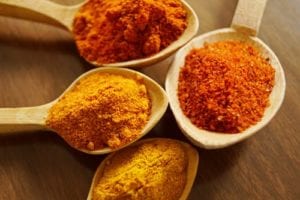Written by Joyce Smith, BS. Longvida® Optimized Curcumin, a patented bioavailable form of curcumin, significantly improved vascular endothelial function by reducing oxidative stress and inflammation and increasing nitric acid bioavailability.
 Vascular endothelial dysfunction is associated with age and appears to develop first in resistance vessels (arterioles) and subsequently in the larger arteries 1. It is increased by a decrease in nitric oxide bioavailability 2 that is partly driven by oxidative stress and increased reactive oxygen species, and chronic low-grade inflammation 3. Approximately 70% of men and women over 60 years of age have cardiovascular disease (CVD) 4; therefore, interventions to reduce the risk of CVD are very important.
Vascular endothelial dysfunction is associated with age and appears to develop first in resistance vessels (arterioles) and subsequently in the larger arteries 1. It is increased by a decrease in nitric oxide bioavailability 2 that is partly driven by oxidative stress and increased reactive oxygen species, and chronic low-grade inflammation 3. Approximately 70% of men and women over 60 years of age have cardiovascular disease (CVD) 4; therefore, interventions to reduce the risk of CVD are very important.
The objective of this study was to translate preclinical findings in older mice to healthy and middle-aged older adults. The authors hypothesized that curcumin supplementation would improve age-related vascular endothelial function in middle-aged and older men and postmenopausal women by increasing nitric oxide bioavailability secondary to a reduction in oxidative stress while also improving large elastic artery stiffness and inflammatory markers. In this 12-week randomized, double-blind, parallel-design study 5, 39 participants (45‐74 years of age) received 2000 mg/day of Longvida® Optimized Curcumin. (Longvida® is a patented finely- lipophilic matrix that is combined with curcumin to protect it from stomach acids and allow its absorption into the bloodstream via the intestinal tract). Resistance artery endothelial function, measured by endothelial dependent dilation (EDD), in the absence and presence of nitric oxide production and oxidative stress, was assessed along with conduit artery endothelial dilation, large elastic artery stiffness and circulating markers of oxidative stress and inflammation.
After 12 weeks, brachial artery flow-mediated dilation (FMDba) increased by 36% (5.7±0.4 vs. 4.4±0.4% at baseline P=0.001), while the placebo showed no change (p=0.8). Neither curcumin nor placebo influenced large elastic artery stiffness or circulating biomarkers of oxidative stress and inflammation (all P>0.1).
Longvida® improved vascular endothelial function by increasing nitric oxide bioavailability through a reduction in vascular oxidative stress and inflammatory signaling in the participating middle-aged and older adults. This reflects an improvement in conduit artery endothelial function of 1.3% FMD units (a 1% improvement in brachial artery FMD units has been associated with a 13% reduction in the risk of future cardiovascular events 6). According to the authors, these results support evidence that supplementation with Longvida® may be a promising therapeutic option for improving vascular health. In addition, this study provides additional support for the ability of Longvida® to promote healthy aging.
Generalization of these results to other curcumin formulations should be done with caution because of the differences in their absorption and bioavailability. A study 7 by Gota et al, using the same formulation as the present study, found that circulating curcumin was detectable in the blood following supplementation with 650 mg of Longvida® and peaked at two hours, while supplementation with an unformulated curcuminoid extract (> 60% of curcumin) was not detectable. To verify present results, future studies using various healthy ethnic groups and those with severe arterial dysfunction or clinically diagnosed CVD are waranted.
Source: Santos-Parker, Jessica R., Talia R. Strahler, Candace J. Bassett, Nina Z. Bispham, Michel B. Chonchol, and Douglas R. Seals. “Curcumin supplementation improves vascular endothelial function in healthy middle-aged and older adults by increasing nitric oxide bioavailability and reducing oxidativee stress.” Aging (Albany NY) 9, no. 1 (2017): 187.
Click here to read the full text study.
Posted March 11, 2019.
Joyce Smith, BS, is a degreed laboratory technologist. She received her bachelor of arts with a major in Chemistry and a minor in Biology from the University of Saskatchewan and her internship through the University of Saskatchewan College of Medicine and the Royal University Hospital in Saskatoon, Saskatchewan. She currently resides in Bloomingdale, IL.
References:
- Celermajer DS, Sorensen KE, Spiegelhalter DJ, Georgakopoulos D, Robinson J, Deanfield JE. Aging is associated with endothelial dysfunction in healthy men years before the age-related decline in women. Journal of the American College of Cardiology. 1994;24(2):471-476.
- Taddei S, Virdis A, Ghiadoni L, et al. Age-related reduction of NO availability and oxidative stress in humans. Hypertension. 2001;38(2):274-279.
- Brandes RP, Fleming I, Busse R. Endothelial aging. Cardiovascular research. 2005;66(2):286-294.
- Ortman JM, Guarneri CE. United States population projections: 2000 to 2050. United States Census Bureau. 2009:1-19.
- Santos-Parker JR, Strahler TR, Bassett CJ, Bispham NZ, Chonchol MB, Seals DR. Curcumin supplementation improves vascular endothelial function in healthy middle-aged and older adults by increasing nitric oxide bioavailability and reducing oxidative stress. Aging (Albany NY). 2017;9(1):187.
- Inaba Y, Chen JA, Bergmann SR. Prediction of future cardiovascular outcomes by flow-mediated vasodilatation of brachial artery: a meta-analysis. The international journal of cardiovascular imaging. 2010;26(6):631-640.
- Gota VS, Maru GB, Soni TG, Gandhi TR, Kochar N, Agarwal MG. Safety and pharmacokinetics of a solid lipid curcumin particle formulation in osteosarcoma patients and healthy volunteers. Journal of agricultural and food chemistry. 2010;58(4):2095-2099.
